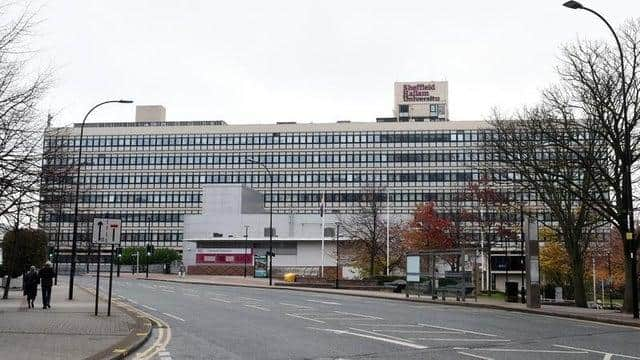Sheffield students demand tuition fee refund after course ‘fails to meet standard promised’
and live on Freeview channel 276
Every one of the 25 postgraduate journalism students at Sheffield Hallam University who completed a student experience survey said they did not think their course represented value for money.
The students, who pay up to £13,500 in tuition fees, have been studying remotely since March 25 when teaching was transferred online. That, they said, left them without access to equipment and software needed to complete some modules, as well as valuable networking opportunities.
Advertisement
Hide AdAdvertisement
Hide Ad“What we were sold when we enrolled isn’t what we received,” said Lydia Turner, an MA International Journalism student who has organised a petition among her course mates calling for a partial refund.


“We can’t justify paying 100 per cent of our semester three fees.”
Lydia said she had to wait more than a month for a response from her department after outlining students’ concerns in an 18-page document and requesting some of their money back.
She said: “There’s a lot of disgust because people enrolled into this course over having a two-week placement and no one has received that.
Advertisement
Hide AdAdvertisement
Hide Ad“A lot of people were under the impression they would receive the NCTJ, the industry’s qualification.”
Twenty-five of the 50 students from the MA International Journalism, Multimedia Journalism and Sports Journalism courses took a student experience survey ran by Lydia, with the results sent to their department. The majority of them said they did not feel sufficient alternatives had been made available by the university following its closure, and the description of their course is not an accurate reflection of the learning experience they received.
Nearly 60 per cent said they felt their mental health had been impacted by the University and College Union (UCU) strikes and coronavirus situation at their university.
Lydia added: “There’s people who struggle with mental health who are all over the place, no matter how much online support they are given.
“People just feel like we weren’t being listened to.”
Advertisement
Hide AdAdvertisement
Hide AdShe claimed her concerns were “completely dismissed” when she eventually received a response from the head of department, Dr Geff Green.
“It was the generic ‘We’ve done the best we can’,” Lydia said.
Lydia said students lost out on teaching time when lecturers took part in UCU strikes over their conditions during November and December, and again in February and March.
At the time, her request for a tuition fee reduction following advice from the Office of the Independent Adjudicator was rejected.
Advertisement
Hide AdAdvertisement
Hide Ad“Their justification was that campus is still running so students could have access to the library. None of that is available to us now at all.”
The students are now following the university’s complaints procedure to try and get a partial refund on their fees.
In response, Claire Sosienski Smith, NUS Vice President (Higher Education), called for student debt to be written off or fee payments reimbursed for those adversely affected by coronavirus.
She said: “The government’s current position that where students are receiving ‘adequate online teaching’ they will not receive tuition fee reimbursements or reductions is not fit for purpose as it is not fair to place the burden on individual students to submit complaints.
Advertisement
Hide AdAdvertisement
Hide Ad“Face-to-face teaching and assessments have had to be hurriedly moved online, and placement and other practical activity has had to be cancelled. We estimate that almost 40% of higher education students have been left unable to access their education online through their courses being unsuitable for online learning.
“Students are lacking access to key resources, such as libraries and spaces, disabled students have been left unsupported, and students and staff have been struggling with other demands on their finances, welfare and wider lives as lockdown restrictions are enforced. The impact of this disruption will not be felt equally, with those on placements and disabled students feeling the impact particularly severely.
“Students must not be forgotten. A Student Safety Net will demonstrate that this government cares about the students of today and recognises the role of all students in our future. We are campaigning for £60m new money in student hardship funding nationwide, and the option to redo the year at no additional cost, or have their debt written off or fee payments reimbursed. We are also developing our proposals for an economic package for those who leave education this year, in light of the poor job market."
A spokesperson for Sheffield Hallam University said they do not guarantee placements.
Advertisement
Hide AdAdvertisement
Hide AdThey said: “We understand and recognise the impact that Covid-19, and the strike period which immediately preceded it, has had on our university community, and we are therefore committed to ensuring there is no detriment to our students’ learning, how they are assessed, and their results because of restrictions arising from Covid-19.
“Staff in the journalism department, and across the university, have worked swiftly and innovatively to put alternative learning and teaching methods, resources and support in place to ensure students’ ability to progress.
“We have introduced a range of measures to support students, both academically and through our wellbeing services, to ensure no one is disadvantaged. More information on this and other measures can be found on our advice page at shu.ac.uk/coronavirus.”